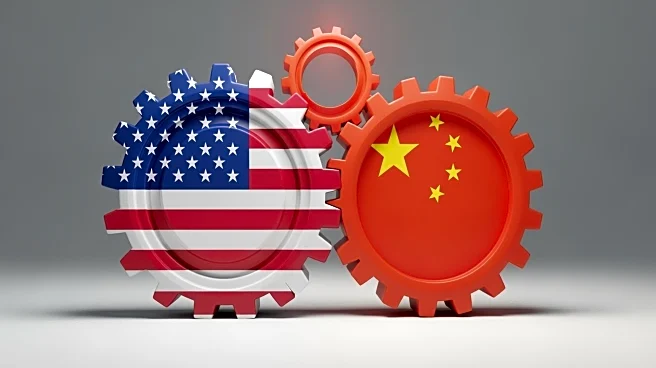What's Happening?
Top economic officials from the United States and China have reached a preliminary consensus on a trade framework during discussions at the ASEAN summit in Kuala Lumpur. U.S. Treasury Secretary Scott Bessent
and Trade Representative Jamieson Greer met with Chinese Vice Premier He Lifeng and top trade negotiator Li Chenggang. The talks focused on deferring China's expanded export controls on rare earth minerals and magnets, and avoiding a new 100% U.S. tariff on Chinese goods. President Trump expressed confidence in reaching a deal with Chinese President Xi Jinping in their upcoming meeting. The discussions also covered soybean and agricultural purchases from American farmers, balanced trade, and resolving the U.S. fentanyl crisis.
Why It's Important?
The agreement on a trade framework is significant as it aims to ease tensions between the world's two largest economies, which have been marked by sanctions, export curbs, and threats of retaliatory measures. The potential deal could impact U.S. industries reliant on rare earth minerals and agricultural exports, providing relief to American farmers and manufacturers. Additionally, addressing the fentanyl crisis could have public health implications in the U.S. The outcome of these talks may influence global economic stability and trade dynamics, affecting stakeholders in various sectors.
What's Next?
President Trump and President Xi are expected to meet in South Korea on October 30 to discuss the trade framework further. Both sides will undergo internal approval processes for the preliminary consensus reached. The leaders' meeting could result in a formal agreement, potentially altering existing tariffs and export controls. Stakeholders, including U.S. farmers and manufacturers, will be closely monitoring the developments, as the outcome could impact trade policies and economic relations between the two nations.
Beyond the Headlines
The trade discussions highlight the complex interplay between economic policies and geopolitical strategies. The focus on rare earth minerals underscores their strategic importance in technology and defense industries. The resolution of the fentanyl crisis also points to the intersection of trade and public health policies. Long-term shifts in trade relations could influence global supply chains and economic alliances, with potential ethical and legal implications for international trade practices.









